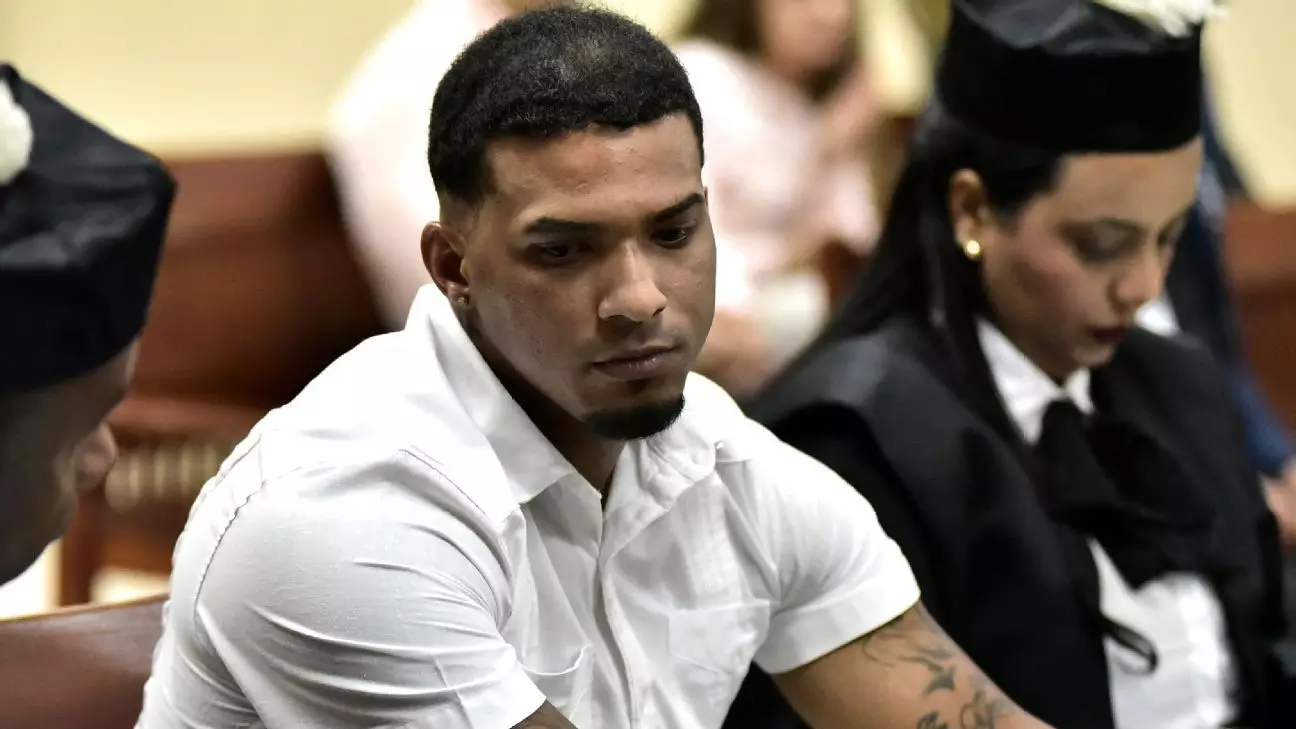In today’s world, fame often carries an immense weight, particularly in the realm of athletics. Wander Franco, once a beacon of hope for the Tampa Bay Rays and a rising star in Major League Baseball (MLB), embodies this paradox. His recent conviction for sexual abuse of a minor underscores a catastrophic fall from grace, not only for Franco personally but also for a league that prides itself on its values and ethics. The trajectory of his career serves as a haunting reminder of how quickly the allure of fame can lead to a downfall steeped in ethical and moral failures.
Franco’s rapid ascendance to stardom was nothing short of remarkable. A highly touted prospect, he signed for a staggering $3.8 million at the age of 16, and by 20, he was lighting up the MLB. Yet this meteoric rise is now overshadowed by the disturbing revelations of his illicit relationship with a 14-year-old girl when he was 21. This case demonstrates not only the troubling behavior of elite athletes who might feel above the law but also the damages inflicted on the lives of vulnerable individuals due to exploitation by those in power.
The Role of Accountability
While the Dominican Republic judiciary has taken a step toward justice by convicting Franco, the suspended two-year sentence reveals the systemic issues that underpin such cases. The prosecution’s quest for a more stringent five-year prison term illustrates a desire for accountability, which the judge’s ruling ultimately falls short of fulfilling. The legal conclusion leaves much to be desired; at a time when society is striving to protect victims and create deterrents against exploitation, leniency sends a troubling message about the consequences of high-profile individuals’ misdeeds.
Critically, the case further dredges up the complexities of parental responsibility, as seen in the conviction of the victim’s mother, Martha Vanessa Chevalier Almonte, who was also found guilty of trafficking her daughter for financial gain. It exposes a cycle of exploitation that can impact the most vulnerable members of society. The depth of this situation serves as an indictment of not just Franco’s actions but also the enabling circumstances surrounding them.
MLB’s Response: A Delicate Dance
Despite MLB affirming its commitment to combatting domestic violence, sexual assault, and child abuse, the ongoing investigation into Franco raises questions about its effectiveness. How can a league that has bent over backward to showcase its dedication to high moral standards allow such a glaring oversight to persist? The answer likely lies in the dichotomy between competitive interest and ethical imperatives. As long as Franco remains a restricted player, MLB can sidestep the financial obligations tied to his lucrative contract, but the broader implications for the league’s integrity and public perception loom large.
The case further complicates Franco’s potential to resume his career in the United States. Securing a work visa seems almost insurmountable in light of his conviction, which could perpetuate his status on the restricted list. The very fabric of the league’s policies designed to protect players and society at large becomes frayed in cases like this, signaling systemic failings in addressing misconduct effectively.
Societal Reflection
Franco’s downfall is more than a tale of individual failure; it prompts society to reflect on the culture of idolization surrounding athletes. Why are athletes often shielded from accountability, even as they wield immense influence? The commodification of sport has led to blurred lines that too often prioritize talent over character. It is crucial for fans, organizations, and especially the children who idolize these athletes to comprehend the dangerous implications of idolizing without scrutiny.
This instance offers an opportunity for society to evolve. Conversations about consent, power dynamics, and the implications of wealth must occupy the forefront of discussions, particularly when innocent lives are irrevocably altered. Sports leagues like MLB carry a heavy responsibility. They must not only implement policies post-factum but should proactively engage in dismantling the culture of silence and complicity that allows such horrific actions to occur unchecked.
Wander Franco’s story should be a wake-up call—an urgent reminder that the most brilliant prospects can also be the bearers of burdens that society must confront head-on.

Leave a Reply